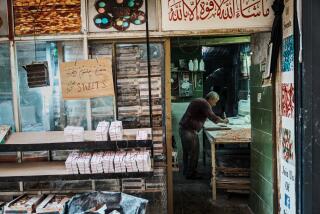Oil Sheikdoms Struggle to Carry On Amid War Jitters : Fallout: The initial shock of Iraq’s invasion passes. Lingering fears can be measured in economic terms.
- Share via
DUBAI, United Arab Emirates — Two weeks after the Iraqi invasion of Kuwait, war jitters have eased but not disappeared in the oil sheikdoms on the Persian Gulf.
In the United Arab Emirates, major developments heard on radio newscasts are passed quickly into the streets. Cab drivers give passengers the latest word. In Qatar and Bahrain, travelers say, the anxiety appears to be higher.
But in all three countries, the initial shock has passed, commerce continues and cautious regimes are working hard to tamp down rumors and build confidence.
In the first 10 days of the crisis, Arab and foreign communities alike were caught up in nervous uncertainty, despite a steady flow of assurances.
Sheik Mohammed ibn Rashid, the Emirates’ defense minister, said in a statement that appeared on the front page of local newspapers that today’s fast-moving events are “incidental and transitory.” The people of the Emirates, Arab and expatriate, “will remain bound together . . . in good times and bad,” he said, in an “oasis of security, love and peace.”
Rashid’s optimistic rhetoric came on the heels of advisories last week from Washington, London and other capitals that foreigners should consider leaving the gulf region. The Soviet government said Wednesday that it will begin evacuating women and children among its nationals in Iraq.
Regional banks reported increased withdrawals by foreign depositors, and travel agencies were bombarded with requests for bookings on outbound flights.
Anxiety over the rising military confrontation along the Saudi-Kuwaiti frontier threatened to shred the alliance of Arabs and expatriates that built the oil fortunes of the gulf states in the 1970s and ‘80s. Editorialists pointed fingers at a few foreign managers who reportedly packed up their families and left suddenly for holidays at home.
But the feared mass flight of expatriates has not taken place, according to airline officials. Planes are overbooked but are leaving with empty seats.
“Passengers tend to be overcautious,” said K. B. N. Nair, airport manager here for Air India. “There are cases of travelers making a series of bookings on different days on different airlines. These create an artificial situation.”
Nevertheless, anxiety continues, and its ups and downs can be measured in economic terms. For example:
Insurance rates for shipping in the gulf have risen, as they did during the tense years of the 1980-88 Iran-Iraq War. Underwriters have raised rates for general shipping and added a premium for vessels planning to call at ports in Iraq or Kuwait. During the 1980s war, when there was open conflict in the gulf, insurers lost more than $1 billion. One life insurance company in Dubai this week reported 75 callers in one day asking whether their policies covered war risks.
The invasion of Kuwait touched off a brief rise in food prices. Government declarations that stocks were sufficient eased concerns, however, and the price of a 40-pound sack of rice fell from about $80 on the weekend to $64 at midweek. Government and consumer spokesmen accused traders of taking advantage of nervous shoppers.
Acting on an alert from currency officials in Qatar, banks and currency-exchange shops were warned about the sudden appearance of counterfeit American bank notes in the region. In the days immediately after the Iraqi invasion, many sought to change their local currency for dollars, their fears spurred by the overnight collapse of the Kuwaiti dinar.
In Dubai, where the economy is buoyed by oil but focused on trade, newspapers list on their front pages the exchange rates for a variety of foreign currencies, along with the price of commodities, shares on foreign exchanges and gold jewelry, a popular form of investment among Arabs and foreign workers.
A bright note was found by the English-language Khaleej Times, which reported the arrival of 40 West German tourists who, despite the threat of conflict, came in for two days of shopping, sunbathing and desert safaris.
More to Read
Sign up for Essential California
The most important California stories and recommendations in your inbox every morning.
You may occasionally receive promotional content from the Los Angeles Times.










